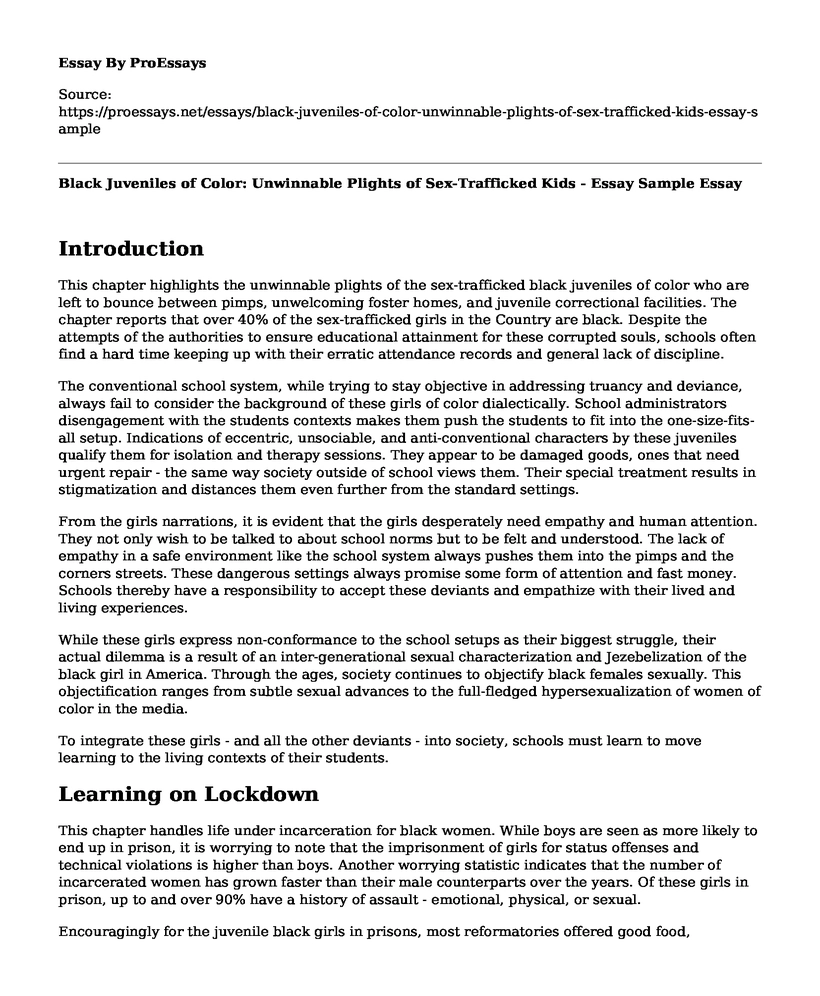Introduction
This chapter highlights the unwinnable plights of the sex-trafficked black juveniles of color who are left to bounce between pimps, unwelcoming foster homes, and juvenile correctional facilities. The chapter reports that over 40% of the sex-trafficked girls in the Country are black. Despite the attempts of the authorities to ensure educational attainment for these corrupted souls, schools often find a hard time keeping up with their erratic attendance records and general lack of discipline.
The conventional school system, while trying to stay objective in addressing truancy and deviance, always fail to consider the background of these girls of color dialectically. School administrators disengagement with the students contexts makes them push the students to fit into the one-size-fits-all setup. Indications of eccentric, unsociable, and anti-conventional characters by these juveniles qualify them for isolation and therapy sessions. They appear to be damaged goods, ones that need urgent repair - the same way society outside of school views them. Their special treatment results in stigmatization and distances them even further from the standard settings.
From the girls narrations, it is evident that the girls desperately need empathy and human attention. They not only wish to be talked to about school norms but to be felt and understood. The lack of empathy in a safe environment like the school system always pushes them into the pimps and the corners streets. These dangerous settings always promise some form of attention and fast money. Schools thereby have a responsibility to accept these deviants and empathize with their lived and living experiences.
While these girls express non-conformance to the school setups as their biggest struggle, their actual dilemma is a result of an inter-generational sexual characterization and Jezebelization of the black girl in America. Through the ages, society continues to objectify black females sexually. This objectification ranges from subtle sexual advances to the full-fledged hypersexualization of women of color in the media.
To integrate these girls - and all the other deviants - into society, schools must learn to move learning to the living contexts of their students.
Learning on Lockdown
This chapter handles life under incarceration for black women. While boys are seen as more likely to end up in prison, it is worrying to note that the imprisonment of girls for status offenses and technical violations is higher than boys. Another worrying statistic indicates that the number of incarcerated women has grown faster than their male counterparts over the years. Of these girls in prison, up to and over 90% have a history of assault - emotional, physical, or sexual.
Encouragingly for the juvenile black girls in prisons, most reformatories offered good food, education, and shelter for the destitute young girls. It was exciting to observe that the criminal legal system was allowing for education and empowerment programs for the girls. Sadly though, it is still reported that up to a third of the youth detainees are subjected to brutalization by prison security.
To contain these rising incarcerations and isolation of these young black girls, schools must devise innovative systems that allow for differentness and empathy. Ideas, including street School, can properly enable the students to stay open and free in a familiar context instead of being forced into the traditional classroom. Adaptation is vital for schools, and such innovative research-backed ideas as design thinking, emergent design, as well as proactive differentiation of classes, can go a long way into re-integrating the lost girl back to the community.
Cite this page
Black Juveniles of Color: Unwinnable Plights of Sex-Trafficked Kids - Essay Sample. (2023, May 22). Retrieved from https://proessays.net/essays/black-juveniles-of-color-unwinnable-plights-of-sex-trafficked-kids-essay-sample
If you are the original author of this essay and no longer wish to have it published on the ProEssays website, please click below to request its removal:
- Satirical Essay on Alcohol
- Paper Example on Law Enforcement: Regulation and Control of Drugs
- Role of Women in the Middle East Essay Example
- Adolescents, Drugs, and HIV Risk: A Study in Oregon and Mexico - Essay Sample
- Essay on Study on Alcohol Counseling Practices & Alcohol Consumption Rate in Medical Students
- Measuring Immigrant Acculturation: Vancouver Index - Essay Sample
- Paper Example on Terrorism: A Global Threat to Humanity in the Last Three Decades







